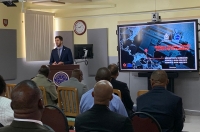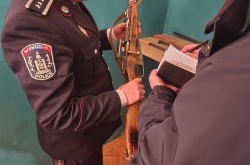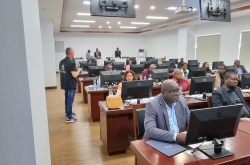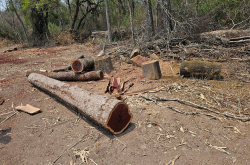BRIDGETOWN, Barbados – With firearms used in more than 70 per cent of murders in the Caribbean, preventing and combating gun crimes in the region is the focus of two regional firearms training courses co-organized by CARICOM’s Implementation Agency for Crime and Security (IMPACS) and INTERPOL.

The training aims to enhance the ability and competencies of national authorities in the Caribbean to more effectively address gun crimes and enhance information sharing so as to combat transnational firearms trafficking.
During the two practical training courses (24 – 28 June), more than 60 INTERPOL National Central Bureau (NCB) and Caribbean national firearms experts are receiving advanced training on key INTERPOL global policing capabilities, including its Illicit Arms Records and Tracing Management System (iARMS), INTERPOL Ballistic Information Network (IBIN) and the INTERPOL Firearms Reference Table (IFRT).
The participants are also being provided with in-depth understanding of the INTERPOL firearms programme, its firearms recovery protocol, IBIN search protocol, interview techniques for investigating firearms trafficking.

The training includes presentations on the firearms toolkits of CARICOM IMPACS and the Organisation of American States (OAS).
Funded by CARICOM IMPACS, the initiative ensures that INTERPOL’s tools and training expertise are in synergy with CARICOM IMPACS’ Firearms Assistance Package to provide technical assistance and enhance the capabilities of law enforcement officers in the Caribbean to prevent and combat firearms crimes, particularly illicit firearms trafficking.

CARICOM IMPACS is the coordinating and implementation arm of the region’s multilateral crime and security management architecture, specifically designed to administer a collective response to the crime and security priorities of its Member States.
INTERPOL’s iARMS database is crucial in helping police worldwide trace seized illicit firearms. Upon the seizure of a firearm, a trace request can be quickly sent to the country of manufacture or last legal import or any other country on the investigative trail in order to track the history of the firearm’s ownership.
With almost 1.5 million records, iARMS can help identify firearms trafficking patterns and smuggling routes. The iARMS project is funded by the European Union.

Participating countries and regional organizations in the training courses: Anguilla (UK), Antigua and Barbuda, the Bahamas, Barbados, Belize, Bermuda (UK), British Virgin Islands (UK), Dominica, Grenada, Guyana, Haiti, Jamaica, Montserrat (UK), Saint Lucia, St. Kitts and Nevis, St. Vincent and the Grenadines, Suriname, and Trinidad and Tobago, as well as the Regional Security System, Joint Regional Communications Centre and the Regional Intelligence Fusion Centre.









